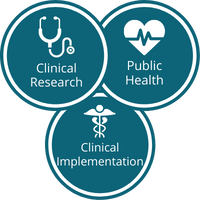MIRECC / CoE
Diverse Populations Research | Rocky Mountain MIRECC for Suicide Prevention
 |
|||
 |
 |
 |
 |
The Rocky Mountain Mental Illness Research, Education and Clinical Center (MIRECC) for Suicide Prevention carries out research in both the Rocky Mountain Regional VA and Salt Lake City VA. We also partner across the U.S. with other VA sites, the Department of Defense and in local communities. Our research has informed changes to policy and practice throughout VHA and the community. Keep reading to learn more and see specific examples of our research.
Our Research Focus Areas
Suicide is complicated and has multiple causes. We study suicide from multiple angles, looking at factors that might put a Veteran at risk for suicide, as well as factors that help protect Veterans from suicidal thoughts or behaviors.
Our research covers a wide range of topics related to suicide prevention, including the neurobiology of suicide, clinical and behavioral interventions targeting suicidal behavior, tailoring treatments to diverse Veteran populations and implementation of evidence-based practices for suicide prevention. Our programs and research are also aligned with the National Strategy for Preventing Veteran Suicide.
Suicide Prevention Among Diverse Populations

Several of our investigators conduct research that aims to understand how suicide risk factors and treatment preferences vary across different Veteran populations and how suicide prevention efforts and can be tailored to diverse Veteran populations, particularly those at higher risk for suicide. Some of these Veteran populations include:
- Women Veterans
- Survivors of military sexual trauma (MST)
- Racially and ethnically diverse Veterans
- Veterans not engaged in Veterans Health Administration (VHA) services
- Veterans experiencing or at risk for homelessness
- Veterans involved with the criminal justice system
- Rural Veterans
Advancing Suicide PreventIon for undeRserved vEterans (ASPIRE) Lab
The ASPIRE Lab at the Rocky Mountain MIRECC for Veteran Suicide Prevention is led by Drs. Claire Hoffmire, Ryan Holliday and Lindsey Monteith. Through mixed-methods research and clinical demonstration projects, they seek to understand how suicide prevention efforts can be tailored to diverse Veteran groups. Their work focuses on Veterans who have been previously underserved or underrepresented in research in order to improve suicide prevention for all Veterans.
Visit the ASPIRE website for more information about their lab, studies and research findings.
Racially and Ethnically Diverse Veterans: Native Veterans
Dr. Nathaniel Mohatt and his team at the Rocky Mountain MIRECC work in partnership with Tribal communities on a number of research projects to advance suicide prevention for Native Veterans and indigenous populations. Like many racially and ethnically diverse Veteran sub-groups, Native Veterans are at higher risk of suicide than the general population. The publication linked here highlights their findings about developing practical approaches and solutions to reducing suicide among Native Veterans from a community-driven approach. This research is in the public health phase of the translational model. Learn more by reading this article, Suicide-related behaviors among American Indian and Alaska Native Veterans: A population-based analysis.
Our research about the suicide prevention among diverse Veteran populations is within the Clinical Research, Clinical Implementation, and Public Health phases. Visit the translational model page to learn more about these and other phases in the model.

Explore other research focus areas
Research Findings
The documents listing publications from Rocky Mountain MIRECC-affiliated research are currently down for extended maintenance while we improve the accessibility. Thanks for your patience and we apologize for the inconvenience.
Questions? We strive to make our content accessible to all, and we know you may be temporarily unable to find the publications that used to be available here. If we can assist you while the page is down and for any questions about the publications web maintenance, please contact us at RockyMountainMIRECC@va.gov.
Quick Links to Study Websites
- Understanding Transgender and Gender Diverse Veterans’ Experiences, Needs, and Preferences
- VA Patient Safety Center of Inquiry - Suicide Prevention Collaborative (PSCI-SPC)
- Home-Based Measurement of Circadian Timing in Veterans with Traumatic Brain Injury and Insomnia (Home Circadian)
- Promoting mental health wellness and safety among Veteran firearm owners (FFAST)
- Assessing Social & Community Environments with National Data (ASCEND)
- Suicide Risk and Prevention among Asian American and Pacific Islander Veterans
- Military and Veteran Microbiome: Consortium for Research and Education (MvM CoRE)
- Facilitating Assessment of At-Risk Sailors using Technology (FAAST)
- Advancing Suicide Prevention for Underserved Veterans (ASPIRE) Lab
Site Map
Last Updated 18 February 2022
























